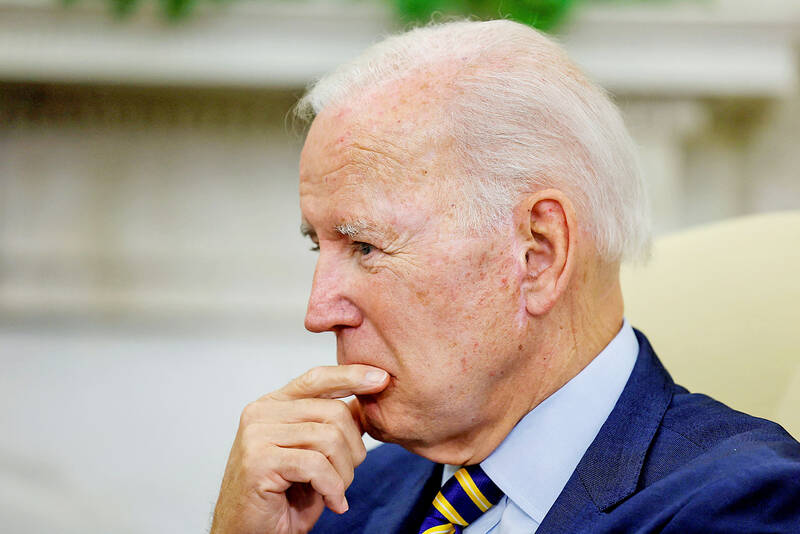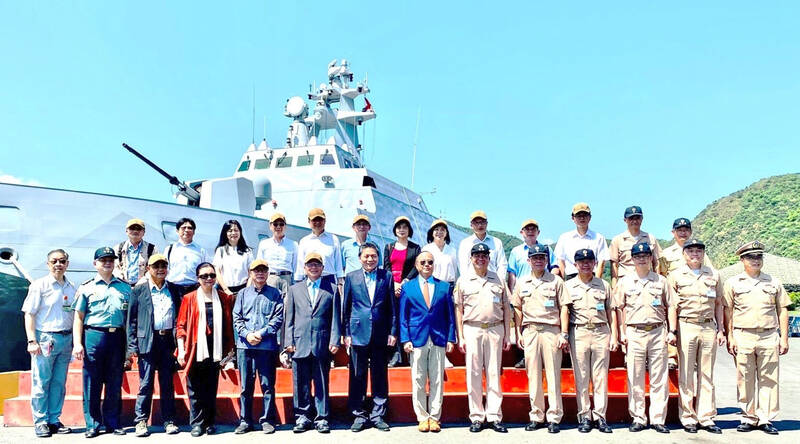US President Joe Biden’s remarks that US troops would help defend Taiwan in the event of a Chinese invasion “speak for themselves,” US National Security Council Indo-Pacific Coordinator Kurt Campbell said on Monday, adding that US policy on Taiwan remains consistent and unchanged.
In a prerecorded interview with the CBS show 60 Minutes that aired on Sunday, Biden told host Scott Pelley that the US would defend Taiwan “if in fact there was an unprecedented attack.”
“So unlike Ukraine, to be clear, sir, US forces — US men and women — would defend Taiwan in the event of a Chinese invasion?” Pelley asked.

Photo: Reuters
“Yes,” Biden said.
After the interview, a White House official said US policy on Taiwan had not changed, according to 60 Minutes.
Campbell said he did not believe it was appropriate to describe the White House statement “as walking back the president’s remarks.”

Photo courtesy of the Control Yuan
“The president’s remarks speak for themselves. I do think our policy has been consistent and is unchanged and will continue,” he said during an online conference organized by the Washington-based think tank Carnegie Endowment for International Peace.
The US’ primary goal is to maintain peace and stability across the Taiwan Strait to secure and stabilize the “status quo,” make sure there is healthy dialogue between the sides and try to avoid escalation, he said.
Representative to the US Hsiao Bi-khim (蕭美琴) told reporters in Washington that she believed Biden “speaks his mind.”
Taipei and Washington would continue to work closely to maintain peace and security in the region, and maintain the “status quo,” she added.
Taiwanese academics said that Biden’s remark is meant to reaffirm Washington’s commitment to Taipei and deter Beijing.
Biden is gradually moving away from “strategic ambiguity,” because he has full confidence in President Tsai Ing-wen’s (蔡英文) pledge to maintain the “status quo,” said Shen Ming-shih (沈明室), director of the National Security Research Division at the government-funded Institute for National Defense and Security Research.
Taiwan’s restraint in response to China’s increasingly assertive military coercion has assured Biden that Taipei would not take any aggressive action, Shen said.
Taiwan’s actions have been defensive in nature and are meant to bolster its sovereignty instead of declaring independence, he added.
Biden’s remarks also express a tougher stance against China following Beijing’s drills around Taiwan last month, with an eye on the US midterm elections, said Shen, a retired army infantry battalion commander.
Chieh Chung (揭仲), an associate defense research fellow at the Chinese Nationalist Party’s (KMT) National Policy Foundation think tank, said he believed the US “would definitely in some way intervene” if China launched a full-scale invasion of Taiwan.
Washington would not sit idly by if Beijing attempted to unilaterally change the “status quo” in the west Pacific by force, because that would undermine the US’ Indo-Pacific strategy and lead other US allies to question its leadership, he said.
However, Chieh said he was concerned because Washington does not have a mutual defense treaty with Taiwan and Beijing has nuclear weapons.
Washington could intervene “too late” and deploy “too few” military resources to aid Taiwan, he added.
During the interview Biden also said that “Taiwan makes their own judgements about their independence. We are not encouraging their being independent. That’s their decision.”
His critics said that China could perceive the comments as tacit support for an independence declaration.
They added that his comments are more likely to aggravate hostilities than overt defense commitments, as Beijing already likely assumes Washington would defend Taiwan.
“It is incoherent to argue that America’s Taiwan policy has not changed while also claiming that the US has a commitment to fight for Taiwan and that Taiwan makes its own judgements about independence,” said Craig Singleton, a China policy expert at the Foundation for Defense of Democracies.
Beijing will likely worry that Biden is suggesting Taiwan can decide for itself whether it is independent, he added.

SECURITY: As China is ‘reshaping’ Hong Kong’s population, Taiwan must raise the eligibility threshold for applications from Hong Kongers, Chiu Chui-cheng said When Hong Kong and Macau citizens apply for residency in Taiwan, it would be under a new category that includes a “national security observation period,” Mainland Affairs Council (MAC) Minister Chiu Chui-cheng (邱垂正) said yesterday. President William Lai (賴清德) on March 13 announced 17 strategies to counter China’s aggression toward Taiwan, including incorporating national security considerations into the review process for residency applications from Hong Kong and Macau citizens. The situation in Hong Kong is constantly changing, Chiu said to media yesterday on the sidelines of the Taipei Technology Run hosted by the Taipei Neihu Technology Park Development Association. With

A US Marine Corps regiment equipped with Naval Strike Missiles (NSM) is set to participate in the upcoming Balikatan 25 exercise in the Luzon Strait, marking the system’s first-ever deployment in the Philippines. US and Philippine officials have separately confirmed that the Navy Marine Expeditionary Ship Interdiction System (NMESIS) — the mobile launch platform for the Naval Strike Missile — would take part in the joint exercise. The missiles are being deployed to “a strategic first island chain chokepoint” in the waters between Taiwan proper and the Philippines, US-based Naval News reported. “The Luzon Strait and Bashi Channel represent a critical access

‘FORM OF PROTEST’: The German Institute Taipei said it was ‘shocked’ to see Nazi symbolism used in connection with political aims as it condemned the incident Sung Chien-liang (宋建樑), who led efforts to recall Democratic Progressive Party (DPP) Legislator Lee Kun-cheng (李坤城), was released on bail of NT$80,000 yesterday amid an outcry over a Nazi armband he wore to questioning the night before. Sung arrived at the New Taipei City District Prosecutors’ Office for questioning in a recall petition forgery case on Tuesday night wearing a red armband bearing a swastika, carrying a copy of Adolf Hitler’s Mein Kampf and giving a Nazi salute. Sung left the building at 1:15am without the armband and apparently covering the book with a coat. This is a serious international scandal and Chinese

COUNTERINTELLIGENCE TRAINING: The ministry said 87.5 percent of the apprehended Chinese agents were reported by service members they tried to lure into becoming spies Taiwanese organized crime, illegal money lenders, temples and civic groups are complicit in Beijing’s infiltration of the armed forces, the Ministry of National Defense (MND) said in a report yesterday. Retired service members who had been turned to Beijing’s cause mainly relied on those channels to infiltrate the Taiwanese military, according to the report to be submitted to lawmakers ahead of tomorrow’s hearing on Chinese espionage in the military. Chinese intelligence typically used blackmail, Internet-based communications, bribery or debts to loan sharks to leverage active service personnel to do its bidding, it said. China’s main goals are to collect intelligence, and develop a